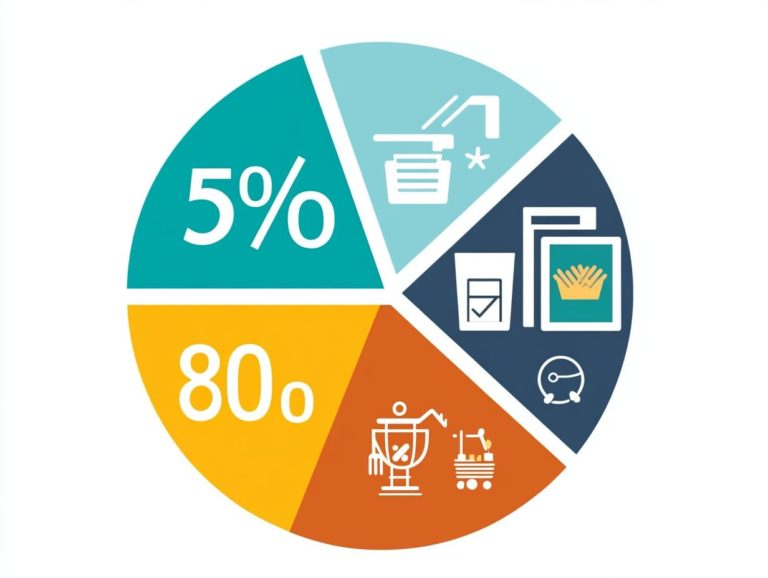The Benefits of Group Budgeting Sessions
Are you looking for a way to improve your organization s financial planning? Group budgeting is an approach that unites teams in a collaborative effort to navigate the complexities of financial planning. By engaging in collective decision-making, you can foster greater accountability, enhance communication, and elevate teamwork within your organization.
This article delves into the numerous benefits of group budgeting sessions, offering practical guidance on how to conduct them effectively. You ll discover how to set clear goals and maintain accountability, with tips designed to ensure that the budgeting process not only meets your financial targets but also strengthens team cohesion.
Contents
- Key Takeaways:
- Benefits of Group Budgeting Sessions
- How to Conduct a Successful Group Budgeting Session
- Tips for Keeping Group Budgeting Accountable
- Frequently Asked Questions
- What are the benefits of group budgeting sessions?
- How can group budgeting sessions improve budget accuracy?
- Are group budgeting sessions time-consuming?
- What role do group dynamics play in group budgeting sessions?
- Can group budgeting sessions lead to increased accountability?
- How can group budgeting sessions benefit team morale?
Key Takeaways:

- Group budgeting allows for collaborative decision-making, leading to a more comprehensive and well-rounded budget that reflects the needs and goals of the entire group.
- Group budgeting promotes increased accountability, as each member is responsible for contributing to the budget and ensuring its success.
- Conducting group budgeting sessions can improve communication and teamwork within a group, fostering a more cohesive and efficient working dynamic.
What is Group Budgeting?
Group budgeting is a team effort that invites you to engage with various stakeholders anyone involved in decision-making, including team members, managers, and other contributors in the financial decision-making process surrounding budget management within your organization. This approach cultivates financial leadership, which is essential for effective resource allocation and strategic planning especially in educational institutions like the University of Kentucky and Virginia Commonwealth University, where being responsible with money is crucial.
By incorporating diverse perspectives, group budgeting enhances transparency and aligns departmental financial goals with the overarching mission of the institution. Take, for instance, Miko McFarland’s leadership development initiatives; they emphasize the pivotal role that effective group budgeting plays in enabling teams to take ownership of their financial decisions.
As you and your colleagues work collaboratively to determine funding priorities, you not only boost accountability but also ensure that resources are directed toward areas that yield the greatest impact, such as student support services and innovative educational programs.
This collective approach not only elevates budgeting performance but also nurtures a culture of collaboration and shared responsibility, paving the way for a sustainable financial future for your institution.
Benefits of Group Budgeting Sessions
Group budgeting sessions unlock incredible benefits for your organization! You’ll experience enhanced collaboration among stakeholders, fostering a sense of shared responsibility and commitment.
This approach improves financial accountability and creates a transparent budgeting process that aligns seamlessly with the strategic goals of your educational initiatives.
Collaborative Decision Making
Engaging in collaborative decision-making during group budgeting invites a sense of shared responsibility that significantly enhances stakeholder engagement. It ensures that every voice is heard, especially when tackling pressing issues like crisis response during difficult fiscal times.
This approach not only democratizes the financial planning process but also sparks diverse perspectives that can lead to innovative solutions. For example, when a nonprofit organization faced budget cuts, bringing together staff from various departments allowed them to prioritize essential programs while efficiently reallocating resources.
Involving financial experts in these discussions can offer invaluable insights, ensuring that your decisions are rooted in solid data. By embracing collaboration, you often uncover a more nuanced understanding of your financial landscape, ultimately resulting in improved resource allocation and greater adaptability in managing funds.
Increased Accountability
Increased financial accountability is a notable advantage of group budgeting, as it prompts you to take ownership of your contributions, ultimately enhancing budget performance throughout the budgeting cycle.
This shift not only boosts your individual responsibility but also fosters a sense of collective commitment among your team. When you recognize that your insights and decisions directly impact the budget outcomes, you’re more likely to engage proactively in financial discussions.
The skills required for effective financial leadership such as strategic thinking, communication, and analytical prowess are essential in this process. Leaders who embody these qualities can guide you and your team to align daily financial activities with broader fiscal objectives, ensuring that both short-term achievements and long-term goals are pursued with confidence and foresight.
Improved Communication and Teamwork

Improved communication and teamwork are vital elements of successful group budgeting, allowing you and your team members to share insights, ideas, and concerns. This teamwork helps create better budgeting tools and financial systems.
When you engage in open collaboration, you are more likely to find financial gaps and opportunities. This participatory approach not only enhances transparency but also sparks innovative solutions tailored to your specific needs.
Incorporating techniques such as regular feedback cycles and structured brainstorming sessions creates an environment where everyone feels valued and heard. Through these methods, each member has the opportunity to constructively critique proposals, resulting in improved strategies that align with budget discipline and educational funding objectives.
Ultimately, when you prioritize effective communication, it nurtures a cohesive team dynamic, ensuring a more streamlined budgeting process that fulfills the overarching goals of your organization.
How to Conduct a Successful Group Budgeting Session
Conducting a successful group budgeting session requires meticulous planning and the establishment of clear goals and objectives. It s essential to employ effective facilitation techniques that guide the process, fostering an environment that encourages stakeholder engagement and collaboration throughout the session.
Setting Goals and Objectives
Setting clear goals and objectives is a foundational step in your budgeting process. It aligns your team’s efforts with the organization’s long-term planning, ensuring that your financial goals are not just aspirational but also achievable and measurable.
By honing in on specific metrics, you can allocate resources more effectively, monitor your progress, and make necessary adjustments along the way. Establishing measurable objectives like aiming to increase revenue by a certain percentage or reducing operational costs within a defined timeframe reinforces accountability and cultivates a culture of fiscal responsibility.
For instance, if your marketing team sets a goal to boost customer acquisition by 15% in the next quarter, you can allocate your budget strategically, prioritize the right advertising channels, and track results in real time. This structured approach to goal-setting not only aids in daily decision-making but also strengthens your organization s long-term financial health and strategic vision.
Establishing Ground Rules
Establishing ground rules for your group budgeting sessions is essential for ensuring accountability, maintaining focus, and cultivating an atmosphere of respect and collaboration among all participants.
- One person speaks at a time.
- All ideas are valid.
These guidelines function as a framework, enabling each member to express their ideas clearly while contributing without the fear of judgment. Encouraging regular check-ins ensures that everyone s input is valued, allowing contributors to stay aligned with the group’s objectives. By fostering this collaborative atmosphere, these ground rules not only enhance dialogue but also lead to informed decision-making, ultimately elevating the overall effectiveness of the budgeting process.
Get ready to take charge conduct your next group budgeting session with confidence and clarity!
Effective Ways to Lead Discussions
Effective ways to lead discussions are essential for guiding your group budgeting sessions. They ensure discussions remain productive and foster stakeholder collaboration that leads to meaningful outcomes, especially during crisis response.
By using different strategies like active listening, open-ended questions, and structured brainstorming you can significantly improve the dynamics of these meetings. Encouraging participants to share their views freely and genuinely valuing diverse opinions creates a space where ideas flow more naturally.
Incorporating techniques like consensus-building and prioritization exercises allows team members to take collective ownership of the budgeting process. This approach helps in achieving financial clarity and strengthens bonds among stakeholders. Ultimately, it leads to more sustainable and informed financial decision-making.
Tips for Keeping Group Budgeting Accountable

Maintaining accountability in group budgeting requires regular check-ins, transparent communication, and strong budget strategies that align with your financial decision-making processes.
Regular Check-Ins and Follow-Ups
Regular check-ins and follow-ups are crucial for keeping everyone accountable in group budgeting. These practices create opportunities to assess progress and make timely adjustments to your budget.
Such interactions foster open dialogue among participants, encourage transparency, and promote shared responsibility for financial decisions. For example, scheduling bi-weekly meetings allows you and your group to review expenditures, celebrate milestones, and promptly address any overspending or budget deviations.
Using collaborative budgeting tools, such as shared spreadsheets or apps, enhances engagement and allows for real-time updates. These strategies foster a sense of collective ownership and significantly increase the likelihood of sticking to the budget.
Your group is more likely to meet its financial goals while building trust and cooperation among all members.
Encouraging Participation and Progress
Encouraging participation in group budgeting sessions is a powerful way to boost employee involvement and foster a real sense of ownership. This approach supercharges your budgeting process for better results!
By integrating various incentives such as recognition programs, team-building activities, or financial bonuses you can greatly increase engagement. These strategies motivate individuals to share their ideas and insights, ensuring that every voice is heard.
However, be aware of potential challenges like unequal participation or pressure from incentives. Balancing these tactics with a commitment to a positive culture that prioritizes collaboration and open feedback will create an environment where employees feel valued. This encourages long-term commitment and success in budgeting initiatives.
Frequently Asked Questions
Here are common questions about group budgeting sessions.
What are the benefits of group budgeting sessions?
Group budgeting sessions allow for collaboration and different perspectives, leading to more comprehensive and effective budget plans.
How can group budgeting sessions improve budget accuracy?

By involving multiple individuals in the budgeting process, group sessions help identify potential errors and ensure all necessary expenses are accounted for.
Are group budgeting sessions time-consuming?
While group sessions may take longer than individual budgeting, the benefits of greater accuracy and buy-in from all participants often far outweigh any extra time spent.
Don’t miss out on the benefits that effective budgeting can bring!
What role do group dynamics play in group budgeting sessions?
Group dynamics encourage open communication and brainstorming. Helpful feedback leads to a successful budget plan.
Can group budgeting sessions lead to increased accountability?
When a team is involved in budgeting, everyone feels ownership. This shared responsibility boosts accountability for sticking to the budget.
How can group budgeting sessions benefit team morale?
Group budgeting sessions ignite teamwork and communication. Working towards a shared goal can enhance overall morale and motivation.






